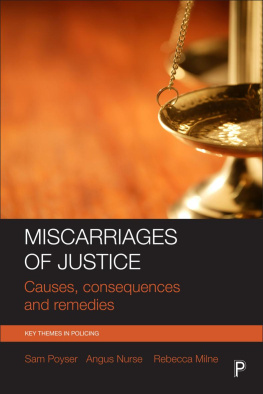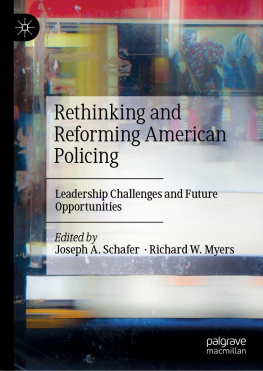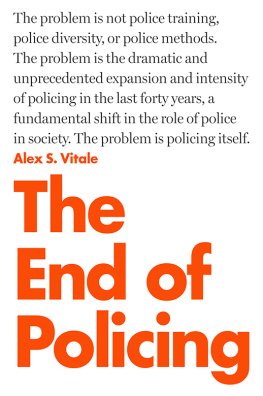Rethinking Policing and Justice
It has become somewhat axiomatic to refer to the police as the gatekeepers of the criminal justice system and thus as a mechanism for the provision of justice. And yet, when we conceptualize the police in this way, what is often taken for granted is the exact nature of that role and its larger social meaning. Indeed, we know that police deliver justice more efficiently to some and injustice to others. Rethinking Policing and Justice critically examines the role of policing (both state and non-state forms) in the provision of justice (and injustice). In essence, it presents work that highlights how different communities and groups have sought alternatives to policing, sometimes taking over the functions of policing. It also shows a variety of theoretical, methodology, and other approaches for the critical evaluation of law enforcement, highlighting different insights into alternative modes of policing, as we seek to understand and redraft the relationship between policing and justice.
This book was originally published as a special issue of Contemporary Justice Review.
Luis A. Fernandez is Associate Professor of Criminology and Criminal Justice at Northern Arizona University, USA. He is the author of several books, including Policing Dissent: Social Control and the Anti-Globalization Movement and Shutting Down the Streets: Political Violence and Social Control in the Global Era.
Laura Huey is Assistant Professor of Sociology at the University of Western Ontario, Canada. She is the author of several publications in the fields of policing, victimization and surveillance, including Negotiating Demands: The Politics of Policing of Skid Row in Edinburgh, San Francisco and Vancouver.
Rethinking Policing and Justice
Exploring Alternatives to Law Enforcement
Edited by
Luis A. Fernandez and Laura Huey
First published 2012
by Routledge
2 Park Square, Milton Park, Abingdon, Oxon, OX14 4RN
Simultaneously published in the USA and Canada
by Routledge
711 Third Avenue, New York, NY 10017
Routledge is an imprint of the Taylor & Francis Group, an informa business
2012 Taylor & Francis
This book is a reproduction of Contemporary Justice Review, volume 14, issue 1. The Publisher requests to those authors who may be citing this book to state, also, the bibliographical details of the special issue on which the book was based.
All rights reserved. No part of this book may be reprinted or reproduced or utilised in any form or by any electronic, mechanical, or other means, now known or hereafter invented, including photocopying and recording, or in any information storage or retrieval system, without permission in writing from the publishers.
Trademark notice: Product or corporate names may be trademarks or registered trademarks, and are used only for identification and explanation without intent to infringe.
British Library Cataloguing in Publication Data
A catalogue record for this book is available from the British Library
ISBN13: 978-0-415-69776-7
Disclaimer
The publisher would like to make readers aware that the chapters in this book are referred to as articles as they had been in the special issue. The publisher accepts responsibility for any inconsistencies that may have arisen in the course of preparing this volume for print.
Contents
Laura Huey and Luis A. Fernandez
Marilyn Corsianos
Volker Eick
Michelle Stewart
Michael I. Niman
Danielle Hryniewicz
Vikki Law
Jeff Ferrell
It has become somewhat axiomatic to refer to the police as the gatekeepers of the criminal justice system and thus as a mechanism for the provision of justice. And yet, when we conceptualize the police thusly, what is often taken for granted is the exact nature of that role and its larger social meaning. Indeed, a number of scholars have argued that democratic policing systems can delivery some forms of justice within liberal regimes, but how the various symbolic and operational functions of the police serve the goal of justice remains a question of empirical research and debate. Certainly, we have also seen a wealth of scholarship that contests the view that public policing serves all equally, and thus is a questionable mechanism for accessing justice for each and every citizen. In other words, justice is delivered more efficiently to some folks and injustice to others. The latter perspective raises another whole series of questions as to possible alternatives to existing structures and processes that could make justice more widely accessible. For example, scholarship in this area has been nearexclusively focused on public policing, neglecting the plethora of private policing forms that operate beyond or below the state. Whether or to what extent such forms assist in providing access to justice (through the state or through private means) remains ill-understood.
Our goal in developing this special issue of Contemporary Justice Review was to explore issues related to the role of policing (both state and non-state forms) in the provision of justice. In essence, what we sought to create was a collection of papers that problematize this relationship, as well as developing new theoretical, methodological and other approaches for critically evaluating it. We also sought to create a space in which scholars could offer insights into alternative modes of policing (broadly defined), which present us with new possibilities in understanding and redrafting the relationship of policing to justice.
In the pages that follow, readers will find articles that speak from a range of different perspectives and engage with a number of themes related to our core theme. The article that begins this collection is Marilyn Corsianos Responding to officers gendered experiences through community policing and improving police accountability to citizens, which highlights the issue of how the gendered, hierarchical nature of policing limits any real potential for reform in the areas of community service and public accountability. Corsianos argues for the meaningful implementation of community policing models as a means of not only flattening gendered, raced and other hierarchies within policing organizations to create better working environments for officers, but more importantly to engender ideological shifts necessary to improving policecommunity relations.
Various scholars have drawn our attention to the extended police family (Johnston, 2003) and the ways in which policing functions are increasingly being taken up by actors within the private sector (Bayley & Shearing, 2001; Johnston & Shearing, 2003; Nogala, 2003). Only recently has that attention shifted to the role that community service providers are increasingly playing in policing below the state (Eick, 2003; Huey, 2008). Volker Eicks Policing below the state in Germany: neocommunitarian soberness and punitive paternalism contributes to this growing literature, sounding a dark warning as to the punitive side of altering relations between social workers and their clients, as the former are increasingly cast in the role of policing the latter.
Using observations drawn from ethnographic fieldwork to empirically ground her analysis, in The space between the steps: reckoning in an era of reconciliation, Michelle Stewart explores how efforts by members of Canadas Royal Canadian Mounted Police to create a community crime prevention forum became something very different for local residents. While constituted as a space to discuss the normal crimes of a community, it became a site in which participants instead discussed a shameful fact of Canadas past that lies at the root of many of the crimes within their community: the near-cultural genocide of the indigenous peoples and the lingering effects of the residential school system.





